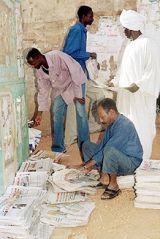Sudan suspends second southern paper
KHARTOUM, June 25 (Reuters) – Sudanese authorities have suspended a second English-language opposition paper and released on bail three of its journalists, accusing them of not being properly registered, the editor of the paper and journalists said on Saturday.

|
|
Men read newspapers in Khartoum. (AFP). |
Three journalists from the first independent southern-based paper, the Juba Post, were arrested on Wednesday in Khartoum and jailed for 24 hours after being told they had not personally registered with the national press council in Khartoum. They were released on a bail of 10 million Sudanese pounds ($4,000).
“The attorney-general has ordered us not to go to press until the trial is done,” Bullen Kinyi, the editor of the paper told Reuters from Juba, the weekly’s southern base.
The Juba Post opened in January.
The attorney-general and national press council were not immediately available for comment on the arrests and suspension.
One of the arrested journalists said that the authorities told him the paper had to have cash in a bank account, have a big office and be registered with a printing press in Khartoum.
Joseph Aligo told them the paper was based in the south and had registered with the local southern government, so did not need to fulfil those obligations. Kinyi said the paper was registered with the national press council even if the individual journalists were not.
“We spent 24 hours in prison with … all kinds of criminals,” Aligo told Reuters.
Khartoum closed down the other southern paper earlier this month, revoking its license. The Khartoum Monitor is one of three opposition dailies based in Khartoum and the only English-speaking independent daily.
It says it had suffered severe censorship after printing articles about deadly clashes between police and refugees from southern Sudan and the remote Darfur region in a refugee camp south of Khartoum last month.
The Juba Post had written outspoken articles criticising the closure of the Khartoum Monitor.
Sudan signed a peace deal with former southern rebels in January which paves the way for a new coalition government, power and wealth sharing and a referendum on secession for the south in 6 years time. The agreement also enshrines press freedom.
Sudan still operates under emergency law, which officials say will be lifted in most of the country after the new constitution is sworn in on July 9.
